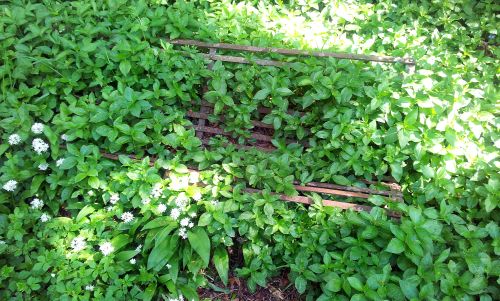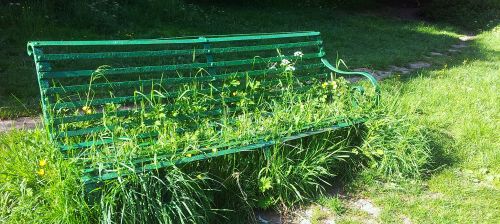June 4 brings “Resounding Compassion” to San Francisco Zen Center
June 4 brings “Resounding Compassion” to San Francisco Zen Center |
- June 4 brings “Resounding Compassion” to San Francisco Zen Center
- May’s Sipress
- Sitting Flowers - Found Within The 'Weeds'
- Bringing Wise Mind to “Mine-golia”
| June 4 brings “Resounding Compassion” to San Francisco Zen Center Posted: 30 May 2012 07:00 AM PDT
The concert will include original pieces by double-bassist Shinji Eshima, who performs for the San Francisco Ballet and San Francisco Opera Orchestras. One piece, titled "All's Farrow," will be accompanied by the debut of a work of art by bronze artist Al Farrow's work — a bell of compassion made of bullets. Eshima will also debut an original piece titled "Circle, Triangle, Square – A Benediction for Peace," accompanied by chanting done by members of the SFZC community and a reading of a Jane Hirshfield poem by Zen Center abbot Myogen Steve Stücky. Performers from the San Francisco Zen Center Ballet and Opera will also be featured, as will other artists. Details Tickets are available here at brownpapertickets.com Read More @ Source |
| Posted: 30 May 2012 06:00 AM PDT
Read More @ Source |
| Sitting Flowers - Found Within The 'Weeds' Posted: 29 May 2012 03:00 PM PDT  Buried now the bench in the woods  and beside the path... Even when the flower of meditation is overtaken by the weeds of busy summer living there is still a place to sit. Though it does become harder and harder to find! Read More @ Source |
| Bringing Wise Mind to “Mine-golia” Posted: 29 May 2012 12:00 PM PDT
A new post from Shambhala SunSpace "Earth Dharma" blogger Jill S. Schneiderman. How shall we bring the Buddhist "perfections of the heart," such as generosity, patience, equanimity, truthfulness, renunciation, and wisdom, to the ways we interact with the earth? I sometimes find myself adopting what might be considered a generous stance of sharing equally what Earth offers. But then I realize that I'm reacting to a feeling of needing more than what I already have. In "The Bodhisattva Path," the eighth-century monk, scholar and poet Shantideva wrote: May I become an inexhaustible treasure Just like space I reflected on these verses, and having listened recently to Sylvia Boorstein's talk "The Paramitas as the Path" and a four-part series on National Public Radio about resource development in the Central Asian nation of Mongolia, I wondered how we human beings might apply Wise Mind to the issue of extraction of Mongolian mineral resources. As reported in the NPR series, the sparsely populated nation of Mongolia is in the midst of a mining boom that has the potential to reduce widespread poverty there. The country is rich in copper and gold, among other metals, particularly in the Gobi region where nomadic herders have traditionally depended on water for sustenance. But water will be used in vast quantities at the copper mega-mine being developed at Oyu Tolgoi ("Turquoise Hill") about 50 miles north of the Chinese border. Mining operations will lower the water table and threaten the livelihood of herders who constitute as much as 40% of the population. Humans have used copper for thousands of years. King Solomon mined it at Timna to help build the temple in Jerusalem. It's a critical resource for most of humanity, but it is also easily recycled. According to the International Copper Association, 80% of the copper ever mined is in use today. So something doesn't feel right about unearthing more copper to lift a portion of a nation's people out of poverty while sacrificing compatriots who will suffer from groundwater depletion. And yet, as Sylvia says (a phrase that is heard nearly every day in my household) when she teaches about the paramis (the fully cultivated mind and heart qualities of a fully awakened being), to practice generosity and equanimity is to be wise. That is, Sylvia teaches that wisdom is an anomalous parami because we can't wake up in the morning and say "Today I am going to be wise." Instead one can treat simply nine of the paramis as aspects of one: wisdom. Is it generous to endorse the actions of Rio Tinto, a massive Australian mining company, so that the financial wealth that accrues from copper mining trickles down to the people of Mongolia? Or is that simply plundering the earth? Perhaps as Sylvia teaches, giving up destructive habits such as surface and underground mining on massive scales is truly the manifestation of generosity. Sylvia also teaches that suffering is caused by the imperative in the mind that things be different. The truth of Mongolia is that it is a landlocked nation with little arable land. Does it make sense to struggle with this reality, to pry from the earth more of what we think we need? In my view, creation of a vast mine in a remote region for the extraction of a recyclable mineral resource seems to be the result of confused rather than clear, wise minds. Read More @ Source |
| You are subscribed to email updates from BuddhaRocks ☸ Buddhist To stop receiving these emails, you may unsubscribe now. | Email delivery powered by Google |
| Google Inc., 20 West Kinzie, Chicago IL USA 60610 | |



